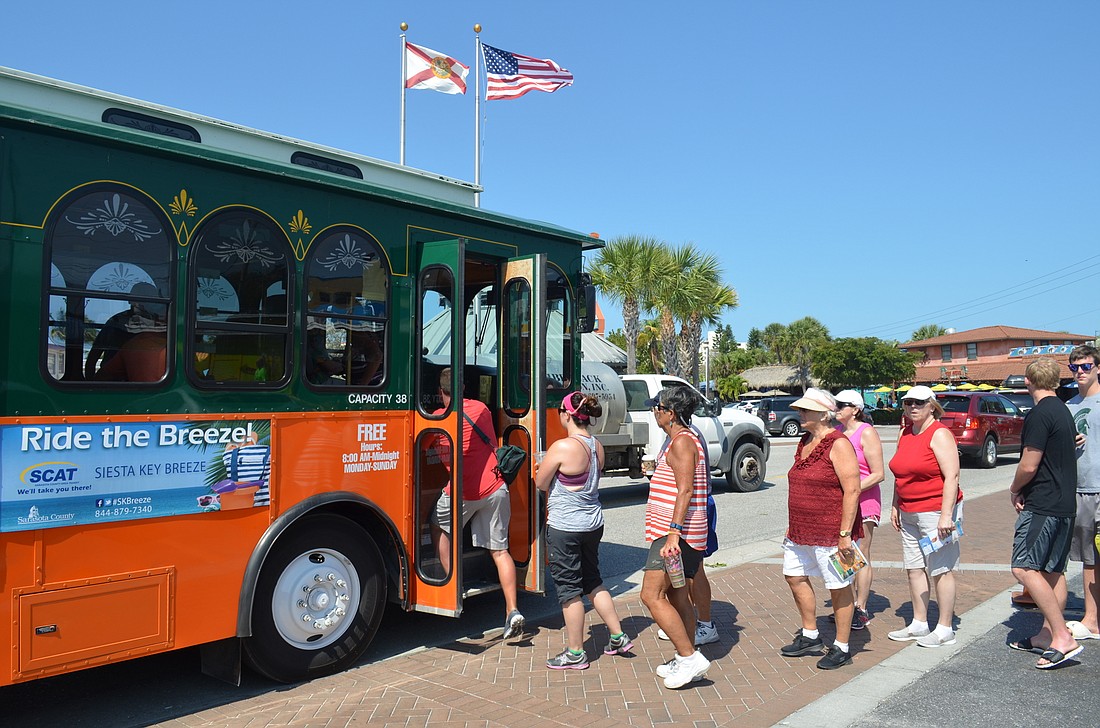- April 18, 2024
-
-
Loading

Loading

In June, when City Manager Marlon Brown asked the Downtown Improvement District to contribute $150,000 toward a new trolley service linking downtown to the barrier islands, the district’s board of directors was cool on the idea.
The DID board — five City Commission appointees who own property within the group’s boundaries — was skeptical about the trolley’s benefits for the other downtown property owners who are part of the self-taxing district. Still, the board approved $50,000 toward the project for fiscal year 2022. Members who favored the contribution framed it as an act of goodwill toward the city.
This month, as the city finalizes its 2022 budget, its relationship with the DID is in a less-harmonious place. Rather than accept the DID’s donation as the board proposed, City Manager Marlon Brown continued to recommend allocating $150,000 from the district toward the trolley project, which would run from east of U.S. 301 to south Lido Key. On Sept. 8, the City Commission voted 3-2 to approve a budget with the $150,000 allocation.
If the City Commission formally adopts that budget, city officials will be using never-before-invoked powers to dictate the use of DID funds.
At a separate Sept. 8 meeting, DID board members expressed displeasure with city officials. Multiple members said that they did not know the commission had the authority to allocate DID funds without the board’s approval. Some board members suggested the budget change could cause property owners to dissolve the district.
“The 240 members could actually vote to disband the DID if the city’s going to use it as a slush fund for their enjoyment,” board member Ron Soto said. “There could be repercussions that are going to happen because of this.”
Although some DID board members assumed the group had autonomy over its budgetary decisions, DID Operations Manager John Moran affirmed the City Commission had final say.
Moran, a participant in the DID’s founding, said the hierarchy of power was a byproduct of the laws used to establish the district in 2006. Those lobbying for the formation of an improvement district looked for state legislation that could make it happen without necessitating a referendum among property owners who would be subject to an extra 2-mill tax. The city authorized the creation of the DID as a dependent special district. Per state law, the budget of a dependent special district is subject to approval or veto by a municipal government.
For more than a decade, the city has adopted resolutions approving the DID budget with a clause that states the commission has the authority to appropriate unallocated funds. Until this year, the city hasn’t adjusted the DID board’s budget recommendations, but top officials looked to taxing districts downtown and on St. Armands Circle as partners to help launch the trolley service. Brown framed the initiative as an economic development program.
At the Sept. 8 meeting, Brown pushed back on the idea the trolley funding undermined the DID’s authority.
“This one time that they’re asking for funding for one project is creating dissension,” Brown said.
DID board member Mark Kauffman said he feared the budget adjustment would not be a one-time aberration.
“The commission is establishing a precedent that whenever they so desire, they can have the ability to invade the cash remaining in our voluntary fund,” Kauffman said.
The commission was divided on the best approach to managing the DID’s budget. Commissioners Liz Alpert and Jen Ahearn-Koch were opposed to allocating the full $150,000 toward the trolley.
“I don’t think it’s right to dictate to them that we’re going to basically sweep their funds,” Alpert said.
Mayor Hagen Brody said he thought it was reasonable to ask the DID to contribute $150,000 toward a transportation project that would include several stops within the district’s boundaries. He said he viewed the trolley service as a better investment than other DID initiatives, specifically mentioning the $194,000 the district spends annually on flower baskets. And despite the DID’s concerns the trolley would take potential customers from downtown to St. Armands and Lido, Brody said the commission was positioned to make a more holistic evaluation of the project.
“There’s been a lot of protectionist talk, and I also hear it on the Circle,” Brody said. “The Circle is worried downtown is going to steal their customers. Downtown is worried the Circle is going to steal their customers. Our job is to look at the whole up here, to improve the city as a whole.”
The majority of the board voted to support Brown’s budget proposal, with commissioners Erik Arroyo and Kyle Battie joining Brody. Arroyo said he believed the DID would benefit from the trolley and that the project would be well received.
DID board members remain disconcerted. Later this year, the DID is scheduled to hold a joint meeting with the City Commission to discuss topics of joint interest.
“I am aghast at the idea that the city wants to have the right to confiscate any unused funds,” Kauffman said.
Although city leaders called the standoff over trolley funding a singular point of disagreement, several DID board members see it as an issue that could call the district’s future into question.
“We might as well just disband and get our 2 mills back,” board member Eileen Hampshire said.